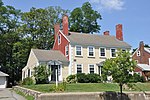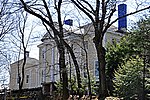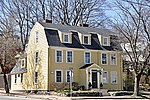Mystic Valley Parkway station
Green Line (MBTA) stationsPages with no open date in Infobox stationProposed railway stations in the United StatesRailway stations in Somerville, MassachusettsUnbuilt buildings and structures in the United States

Mystic Valley Parkway station (also called Route 16 station) is a proposed light rail station on the MBTA Green Line in Somerville, Massachusetts; it would be built as part of a future third phase of the Green Line Extension (GLX). Route 16 would consist of one island platform, which would serve the E branch's two tracks.
Excerpt from the Wikipedia article Mystic Valley Parkway station (License: CC BY-SA 3.0, Authors, Images).Mystic Valley Parkway station
Mystic Valley Parkway, Somerville
Geographical coordinates (GPS) Address Nearby Places Show on map
Geographical coordinates (GPS)
| Latitude | Longitude |
|---|---|
| N 42.416902777778 ° | E -71.127530555556 ° |
Address
U-Haul
Mystic Valley Parkway 600
02474 Somerville
Massachusetts, United States
Open on Google Maps










